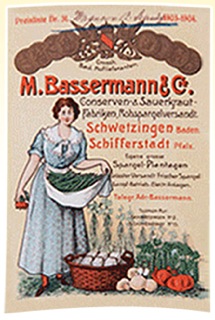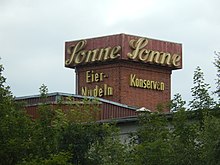Sonnen Bassermann
| Struik Foods Germany GmbH | |
|---|---|
| legal form | GmbH |
| Seat | Frechen , Germany |
| Branch | Food industry |
| Website | www.sonnenbassermann.de |
Sonnen Bassermann is a German brand for soups and ready meals .
overview
The foundation stone for the company was laid in 1896. Over the years, the brands Sonnen and Bassermann, which were later combined, played a key role in the development of canned food and ready-made meals, and in 1986, for example, they first launched menus in microwaveable plastic trays. After an eventful company history, the Sonnen Bassermann brand has been owned by the Dutch food company Struik Foods Europe since spring 2012 . The also Dutch veal company VanDrie Group has held a significant stake in Struik since 2016 .
history
After the invention of tin by Nicolas Appert of two bridges and their distribution in Germany of retired railway official Heinrich Sieburg completed in 1884 on the first single canned vegetables. Encouraged by the positive response, the Sieburg & Co. company was founded for the production of canned fruit and vegetables and in 1890 registered the “Sonne” brand at the “Ducal District Court” in Seesen . Another six years later, the trademark was registered in the new Imperial Patent Office. At first, canning was handcrafted. It was not until 1893 that simple production machines found their way into the factory that still exists today.
The “Bassermann” canning factory in Schwetzingen / Baden went through a similar development at this time . Founded in 1875, on July 18, 1896, a dwarf was registered as a company logo for Bassermann, who was already one of the purveyors to the court of the Grand Duke of Baden in 1903.
Before the First World War, the “Sonne” canning factory in Seesen employed around 150 people. A permanent sales force marketed the products in Berlin, Leipzig and Gdansk. In 1931 the company "Bassermann" was taken over - both brands were initially retained. While the “Sonne” brand appeared in northern, eastern and western Germany, “Bassermann” products were sold in central and southern Germany.
Before the final brand merger to "Sonnen Bassermann" in 1968/69, the first wet ready meals in the can were introduced in 1953 . In 1970 the “Menu from 2” came on the market, which contained the separation of meat / sauce and the side dish. The soups and stews that are known to this day were also produced for the first time under the “Sonnen Bassermann” brand in that year. In 1986 the first menus followed in plastic bowls suitable for microwaves.
In the same year, the family business was taken over by the French BSN group - later Danone . In 1999 it was taken over by the HJ Heinz Company , Pittsburgh, USA. Sonnen Bassermann claims to be the first manufacturer to stop using the flavor enhancer glutamate for ready meals . Instead, yeast and yeast extracts were used. In spring 2012, the Netherlands-based food company Struik Foods finally took over the Sonnen Bassermann brand with the production facility in Beelitz , with the Seesen location being given up. The Beelitz location was given up in autumn 2019 and production relocated to the Netherlands.
Web links
Individual evidence
- ↑ The meat producer Van Drie joins the Sonnen-Bassermann-mother Struik Foods , ad-hoc-news.de, July 20, 2016.
- ↑ End of an era: Beelitzer canned soup factory closes. Retrieved April 27, 2020 .

